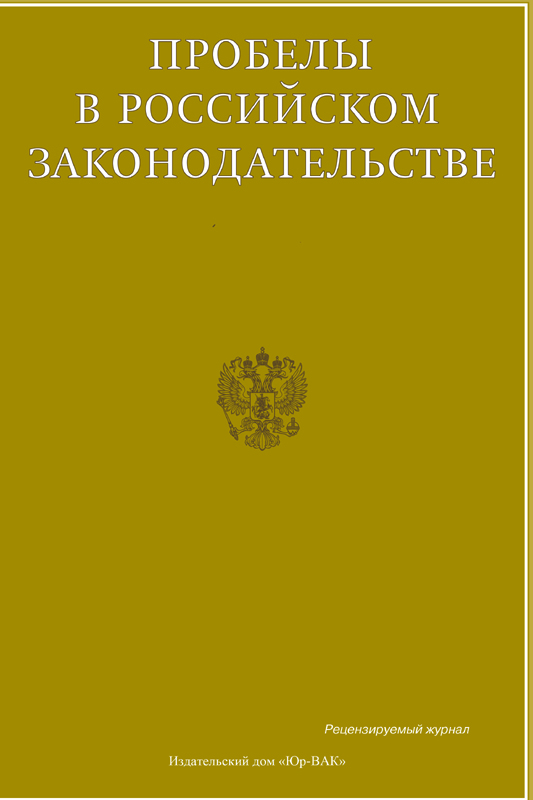Modern Problems of Physical Training of Employees of Internal Affairs Bodies and Ways to Solve Them
- Authors: Tkhazeplov R.L.1
-
Affiliations:
- Krasnodar University of the Ministry of Internal Affairs of Russia
- Issue: Vol 16, No 4 (2023)
- Pages: 98-103
- Section: Current problems of training and development of internal affairs staff in modern conditions
- URL: https://journals.eco-vector.com/2072-3164/article/view/568370
- EDN: https://elibrary.ru/JNXSAP
- ID: 568370
Cite item
Abstract
This article examines the problems faced by students of educational organizations of the Ministry of Internal Affairs of Russia in the process of mastering the discipline "Physical training". It is known that physical training is a necessary condition for achieving high results in official and professional activities, contributes to increasing the level of general efficiency and adaptation of the body of an employee of the internal affairs bodies to extreme conditions of service.
Specialists of physical culture and sports note that modern problems of physical training of employees of the internal affairs bodies may be associated with low motivation for training, limited access to training equipment, as well as various organizational problems. In addition, some employees may have health problems that may interfere with normal physical fitness. Therefore, in order to attract students to sports, it is important to create comfortable conditions for classes, provide them with high-quality equipment and qualified teachers. It is also necessary to conduct public lectures and training sessions on the importance of sports, proper nutrition and a healthy lifestyle.
It is concluded that the lack of motivation is mainly due to misunderstanding and lack of a sense of the importance of discipline. To solve it, it is important to carry out systematic work to increase the motivation of employees to engage in physical training, organize work schedules and optimize the labor process, as well as ensure the availability of modern sports facilities and equipment. In addition, it is necessary to pay attention to the individual training of each listener. The development of a personal program that takes into account the peculiarities of the physical condition and professional activity of the listener will significantly increase the effectiveness of physical training and, accordingly, improve the quality of performance of official duties.
Full Text
About the authors
Rustam L. Tkhazeplov
Krasnodar University of the Ministry of Internal Affairs of Russia
Author for correspondence.
Email: kodzokov.aznaur@bk.ru
Police Major, Lecturer of the Department of Physical Training, North Caucasian institute of professional development (branch)
Russian Federation, Nalchik, KBRReferences
- Voronchikhin D.V., Zalesova O.V. Physical training as a guarantee of successful performance of operational and service tasks of employees of the Department of Internal Affairs of Russia in professional activity // In the collection: Actual problems of the educational process in the discipline "Physical training (culture)" in a higher educational organization. Proceedings of the All-Russian Scientific and Practical Conference. Edited by A.N. Volkov, S.V. Kuznetsov. 2019. pp. 40-42.
- Gusev Yu.M., Pozdnyakov A.P., Domracheva E.Yu., Ilyakhina O.Yu. Physical training as a means of forming psychological readiness of police officers to conduct single combat with offenders // In the collection: Modern problems of physical culture, sports and youth. Materials of the III regional scientific conference of young scientists. Edited by A.F. Syrovatskaya. 2017. pp. 86-89.
- Gushchin D.M. Physical training of police officers // In the collection: Issues of the activities of the services and divisions of the internal affairs bodies of the Russian Federation. Collection of scientific papers of the interdepartmental scientific and practical conference on April 8, 2020. 2020. pp. 140-142.
- Zolotukhin D.V., Egorov S.N. Physical training as one of the components of professional training of police officers // In the collection: Issues of improving the tactical and special training of law enforcement officers. Collection of scientific articles on the results of the III-th All-Russian Conference. 2020. pp. 298-301.
- Kan L.V., Stepantsova M.V., Egorov A.V. Physical training of police officers as one of the criteria of professional training // In the collection: Improving the training of law enforcement officers. Collection of scientific articles based on the results of the scientific and practical conference. 2021. pp. 63-67.
- Kodzokov A.H., Kuznetsov I.V. Some aspects of motivating students to engage in physical training in educational organizations of the Ministry of Internal Affairs of Russia // Physical culture and health. 2021. No. 2 (78). pp. 64-66.
- Meshev I.H. Actual problems of physical training of employees of internal affairs bodies and ways to solve them // Education. The science. Scientific personnel. 2020. No. 2. pp. 235-237.
- Obukhov A.A., Makarov V.M., Nasonov A.E., Nosov S.A. Physical training as a component of the daily activities of employees of the Department of Internal Affairs of the Russian Federation // Izvestiya Tula State University. Physical Culture. Sport. 2020. No. 10. pp. 58-63.
- Slobodchikova T.A. Physical training as a leading section of professional training of police officers // In the book: Training of personnel for law enforcement agencies: modern trends and educational technologies. Collection of materials of the twenty-second All-Russian Scientific and methodological Conference: in 2 volumes. 2017. pp. 156-158.
- Tashiyan A.A. Physical training in the professional activities of police officers // In the collection: Improving the physical training of law enforcement officers. Collection of articles of the All-Russian Round table. Editorial board: S.N. Barkalov [et al.]. 2020. pp. 202-204.
- Shilikhin A.S., Goryacheva D.G. Physical training as one of the most important aspects of the training of police officers // In the collection: Disclosure and investigation of crimes: problems and ways to solve them. Collection of articles of the International Scientific and Practical Conference. 2017. pp. 159-162.
Supplementary files









